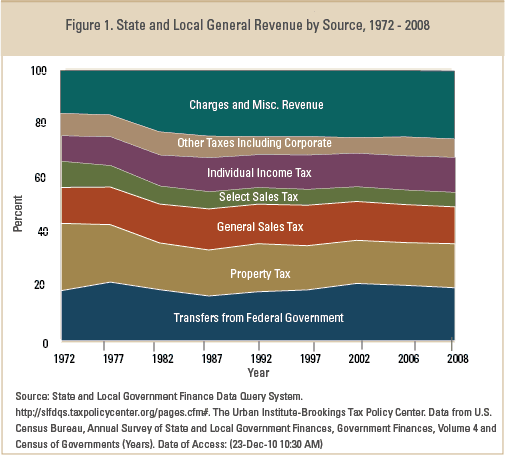Well, this is not surprising: Toni Preckwinkle is "proposing a $1-a-pack tax hike on cigarettes and, as first reported by the Sun-Times, a new so-called violence tax that would cost gun owners a nickel-a-bullet and $25 per firearm they purchase in stores across Cook County." There's more, including what amounts to a cross-county tariff on certain expensive goods, and a gaming-machine tax. It's a plan destined to anger noisy interest groups, particularly the gun lobby; an NRA rep has already compared the idea to Jim Crow laws.
But this is the future, at least at the local level. And it's been slowly coming for awhile, thanks to the sort of conditions we've seen recently (PDF):
The property tax historically has been the main source of local government tax revenue. Most of the relative decline since the 1930's in the property tax share of total local government tax revenue nationally has resulted from greater reliance on local general sales and income taxes—especially for counties and large cities. Local general sales taxes, first adopted in New York City (1934) and New Orleans (1936), came after rising discontent over property tax increases accentuated by foreclosures.
[snip]
Intergovernmental assistance payments–federal aid to states and localities and state aid to local units—rose significantly in the 1930's and again in the 1960's and 1970's, but inflation-adjusted growth in overall federal aid payments has trended downward since 1978. Most federal assistance is currently geared toward health (especially Medicaid), income security, education, and highways that often requires further state contributions.
It's bad, it's nationwide, as UIC's Michael Pagano writes in "Why All Those New Fees Your City is Charging Are Likely Permanent":
Faced with a requirement that they balance their budgets every year, they have borrowed a page from the airline industry: increase fares (i.e., taxes) just a little if at all, and start charging big time for the “extras” that passengers (i.e., taxpayers) want. In the airlines’ case, it’s bag fees and the like that are going up. For cities, it’s charges for little things like, say, putting out fires.
As Pagano shows, charges and miscellany increased as intergovernmental assistance declined. Property taxes as a share of revenue (which aren't popular for a number of reasons, including that they're opaque, and we're taxing something we ostensibly want) have decreased as federal assistance came back a bit. Then there's this:

"Select" sales taxes have actually dropped, but that's because of a decline in tobacco and gas tax revenues (people smoke less and drive more efficient cars). Taxes are supposed to keep people from smoking, but on the other hand, as Preckwinkle notes, they're lazy: "Preckwinkle acknowledged that the county could see cigarette revenues go down, initially, as people go outside the county to purchase cigarettes. But eventually they will return, her research has found."



